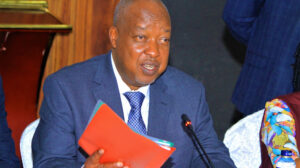Roselyn Akombe has once again raised tough questions about the way Kenyan politics operates, pointing to what she described as deliberate manipulation of citizens by the country’s political class.
The former IEBC commissioner said that most of the rivalries Kenyans witness between leaders are not real but carefully staged to dominate national attention and divert focus from important issues affecting the public.
Her remarks have sparked wide debate, with many Kenyans agreeing that political theatrics have long overshadowed meaningful governance conversations.
According to Akombe, these political feuds are carefully designed to shape narratives and maintain control over public discourse.
She explained that leaders often manufacture conflicts to ensure that citizens remain emotionally invested in their divisions, instead of demanding genuine reforms.
This approach, she said, keeps the spotlight on politicians themselves, leaving little room for new or independent voices that could challenge the status quo.
The end result is a cycle where power remains concentrated in the same circles, and citizens unknowingly play along.
She observed that Kenyans often find themselves choosing sides in these made-up disputes, passionately defending one camp against another without realizing that the supposed enemies frequently share private alliances.
Once the election season ends, the same leaders who appeared bitter rivals are seen working together or attending private meetings, laughing off the very issues they used to argue about in public.
Akombe said this predictable pattern has trapped many voters into repetitive cycles of loyalty that never deliver real change.
Her warning comes at a time when the country is witnessing renewed clashes between political camps, with social media fueling the perception of deep hostility. Akombe noted that online platforms have become powerful tools for spreading these orchestrated rivalries, making them appear authentic and urgent.
The fast spread of political propaganda on platforms like X and Facebook has turned citizens into constant participants in these emotional battles, often without evidence of real ideological differences.
Observers believe the tactic is deliberate, helping politicians control the national agenda while evading scrutiny over corruption, poor service delivery, and mismanagement. By constantly pushing personality-based drama, leaders prevent discussions about healthcare, education, and unemployment from gaining the same level of public interest.
Political analysts say this behavior weakens democracy because it discourages issue-based politics and makes accountability almost impossible.
Akombe urged Kenyans to look beyond the shouting matches and focus on results. She emphasized that it is time citizens start evaluating leaders based on performance and policies rather than political showmanship.
Her message was clear that as long as voters remain entertained by fake conflicts, the ruling class will continue to manipulate them with the same predictable tricks every election cycle.





















Add Comment